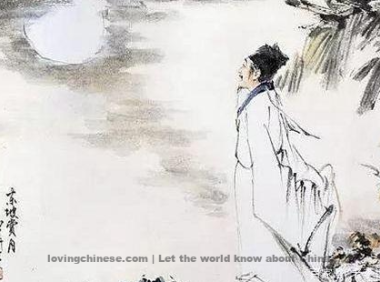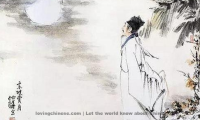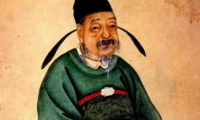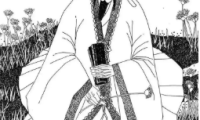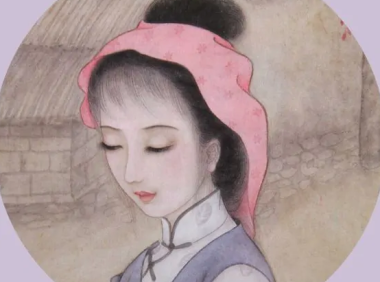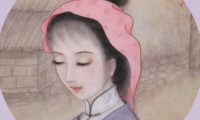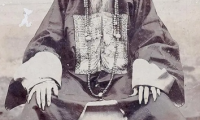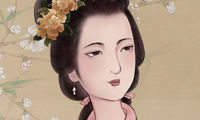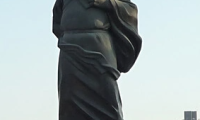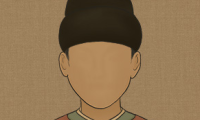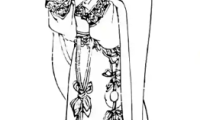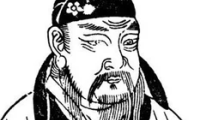-
Hunting Outside Mizhou
江城子·密州出猎 苏轼 〔宋代〕 老夫聊发少年狂,左牵黄,右擎苍,锦帽貂裘,千骑卷平冈。为报倾城随太守,亲射虎,看孙郎。酒酣胸胆尚开张。鬓微霜,又何妨!持节云中,何日遣冯唐?会挽雕弓如满月,西北望,射天狼。 Simple Translation I would like to express the heroic aspirations of a young man, holding a yellow dog in my left hand, holding a goshawk in my right arm, wearing a colorful hat, wearing a mink fur coat, and carrying a mighty army like a strong wind, sweeping through the flat hills. In order to repay the kindness of the people to go hunting with them, I am determined to personally shoot the tiger and show everyone Sun Quan's heroic demeanor in fighting the tiger."I drink a lot of good wine, have an open mind, have more courage, and have slightly white temples. What's the difference?"? When will the emperor send someone down, trusting me like Emperor Wen of Han sent Feng Tang to the cloud to pardon Wei Shang? At that time, I will make every effort to draw a full carved bow like a full moon, aiming at the northwest and shooting at the Xixia army. 译文(原文)我姑且抒发一下少年的豪情壮志,左手牵着黄犬,右臂托起苍鹰,头戴华美鲜艳的帽子,身穿貂鼠皮衣,带着浩浩荡荡的大部队像疾风一样,席卷平坦的山冈。为了报答百姓随行出猎的厚意,我决心亲自射杀老虎,让大家看看孙权当年搏虎的英姿。我痛饮美酒,心胸开阔,胆气更为豪壮,两鬓微微发白,这又有何妨?什么时候皇帝会派人下来,就像汉文帝派遣冯唐去云中赦免魏尚一样信任我呢?那时我将使尽力气拉满雕弓就像满月一样,瞄准西北,射向西夏军队。...
- 0
- 0
- 69
-
Calming the Waves by Su Shi.
定风波·莫听穿林打叶声 苏轼 〔宋代〕 三月七日,沙湖道中遇雨,雨具先去,同行皆狼狈,余独不觉。已而遂晴,故作此(词)。 莫听穿林打叶声,何妨吟啸且徐行。竹杖芒鞋轻胜马,谁怕?一蓑烟雨任平生。料峭春风吹酒醒,微冷,山头斜照却相迎。回首向来萧瑟处,归去,也无风雨也无晴。 Simple TranslationOn March 7th, 1082, the fifth year of the Yuanfeng reign of Emperor Shenzong of the Song Dynasty, it rained on the Shahu Road. Someone took the rain gear and left first. Everyone along the way felt very embarrassed, but I didn't think so. After a while, it cleared up and I wrote this poem.Don't pay attention to the sound of rain beating through the woods and leaves, why not open your throat and chant the long whistle and walk calmly. Walking with bamboo sticks and awned shoes is lighter than riding a horse. Wearing a coir raincoat, I can still live my life despite the wind and rain!The cool spring breeze wakes up my drunkenness, slightly cold, but the setting sun at the beginning of the mountain meets me in due time. Looking back at the bleak place where the wind and rain came, I walked back, regardless of whether it was rain or sunny. 译文(原文)宋神宗元丰五年(1082)的三月七日,在沙湖道上赶上了下雨,有人带着雨具先走了,同行的人都觉得很狼狈,只有我不这么觉得。过了一会儿天晴了,就做了这首词。 不用注意那穿林打叶的雨声,何妨放开喉咙吟咏长啸从容而行。拄竹杖、穿芒鞋,走得比骑马还轻便,一身蓑衣任凭风吹雨打,照样过我的一生!春风微凉吹醒我的酒意,微微有些冷,山头初晴的斜阳却应时相迎。回头望一眼走过来的风雨萧瑟的地方,我信步归去,不管它是风雨还是放晴。...
- 0
- 0
- 121
-
Chia Tao: Overnight at a Mountain Temple
Jia Dao 宿山寺 贾岛 众岫耸寒色,精庐向此分。 流星透疏木,走月逆行云。 绝顶人来少,高松鹤不群。 一僧年八十,世事未曾闻。 Overnight at a Mountain Temple Chia Tao Flock of peaks hunched up and colored cold. The path forks here, toward the temple. A falling star flares behind bare trees, and the moon breasts the current of the clouds. Few men come to the very top… One tall pine won’t hold a flock of cranes. One monk here, at eighty, has never heard tell of the “world” down below. (J.P. Seaton 译)...
- 0
- 0
- 80
-
Tang Yanqian: Rugosa Rose
玫瑰 唐彦谦 麝炷腾清燎,鲛纱覆绿蒙。 宫妆临晓日,锦段落东风。 无力春烟里,多愁暮雨中。 不知何事意,深浅两般红。 Rugosa Rose Tang Yanqian Scenting of musk incense in combustion, And garnished with shark gauze1 to veil the green cluster as a decoration, She in the morrow Sol beams, pranks herself after the palatial style for adornment. Alas! With the waft of eastern breeze fall the silk-brocade ornament. Amidst the vernal mist she is flaccid without vitality and vigor. And vexatious with dole and grief in the rainy vesper. Beyond comprehension is her intention To be dressed in rubicundity of deep-delicate coloration. 1. “shark gauze” was a weft of the ancient shark fisherman. Nowadays, it generally refers to thin gauze. (黄龙 译)...
- 0
- 0
- 74
-
He Shuangqing: Yujing qiu: Inscribed on a Portrait of Shuangqing Planting Melons
玉京秋·自题〈种瓜小影〉 贺双卿 眉半敛, 春红已全褪, 旧愁还欠。 画中瘦影, 羞人难闪。 新病三分未醒, 淡胭脂, 空费轻染。 凉生夜, 月华如水, 素娥无玷。 翠袖啼痕堪验。 海棠边, 曾沾万点。 怪近来, 寻常梳裹, 酸咸都厌。 粉汗凝香蘸碧水, 罗帕时揩冰簟。 有谁念。 原是花神暂贬? Yujing qiu: Inscribed on a Portrait of Shuangqing Planting Melons He Shuangqing Eyebrows half in a frown: Springtime color is already faded, And the old sorrow not yet gone. A thin figure in the painting, Ashamed to be seen but hard to avoid it. New illness still hangs on, The painter applies light rouge but in vain. In the cool of the night The moon shines brightly, Chang E shows no blemish. Green sleeves still bear the stains of tears; The spot by the crab apple flower has been Drenched with myriad drops. I wonder why recently combing hair and getting dressed every day, Fixing dishes salty or sour, All seem too much trouble. Powder and sweat in congealed fragrance While she dips the light cloth in blue water And wipes down the bamboo mat: Who is there to recognize her For a flower spirit in temporary exile? (Grace S. Fong 译)...
- 0
- 0
- 69
-
He Shuangqing: Gu luan
孤鸾·病中 贺双卿 午寒偏准, 早疟意初来, 碧衫添衬。 宿髻慵梳, 乱裹帕罗齐鬓。 忙中素裙未浣, 褶痕边, 断丝双损。 玉腕近看如茧, 可香腮还嫩。 算一生凄楚也拚忍。 便化粉成灰, 嫁时先忖。 锦思花情, 敢被爨烟薰尽。 东菑却嫌饷缓。 冷潮回, 热潮谁问? 归去将棉晒取, 又晚炊相近。 Gu luan He Shuangqing Noon shivers are unfairly punctual: Early the malarial symptoms appear, So I put on another green-colored jacket. With no desire to comb out yesterday’s braids, I hastily tie a kerchief to tidy my side locks. Too busy with work to wash my plain skirt: Along its wrinkled pleats The torn threads are frayed on both sides. My white wrists seen close up are rough and calloused, But these fragrant cheeks are still soft and young. I deem my whole life wretched but I’ll bear it to the bitter end Even if I turn into powder and ash. I foresaw this when I married: Beautiful thoughts and romantic feelings, All would be suffocated in cooking smoke. In the eastern field they only complain that the meal is brought late. The chills return, But no one asks about my fever. I return to fetch the cotton quilts being sunned, And it’s almost time to cook the evening meal again. (Grace S. Fong 译)...
- 0
- 0
- 87
-
He Shuangqing: Chun cong tianshang lai: Plum Blossom
春从天上来·梅花 贺双卿 自笑恹恹, 费半晌春忙, 去省花尖。 玉容憔悴, 知为谁添? 病来分与花嫌。 正腊衣催洗, 春波冷, 素腕愁沾。 硬东风、 枉寒香一度, 新月纤纤。 多情满天坠粉, 偏只累双卿, 梦里空拈。 与蝶招魂, 替莺拭泪, 夜深偷诵《楞严》。 有伤春佳句, 酸和苦, 生死俱甜。 祝花年, 向观音稽首, 掣遍灵签。 Chun cong tianshang lai: Plum Blossom He Shuangqing I laugh at my own sickliness. I took a moment during the busy spring season To visit the flowers’ pointed buds. The haggardness of my jade-like face Has increased, but for whom? Since my illness I have grown estranged from the flowers. Now winter clothes have to be washed, Yet spring waves are cold, And my white wrists are soaked in grief. A stubborn east wind Uselessly blows cold fragrance for a moment Beneath a wisp of a new moon. With so much feeling it drops powder to fill the sky, But it only brings trouble to Shuangqing, In dreams trying to grasp it in vain. I summon its soul with the butterflies And wipe off tears for the orioles; Deep in the night I secretly chant the Lankavatara. I have beautiful lines lamenting spring, Pain and bitterness, Life and death are all sweet. I pray for the flowers’ years. Bowing to Guanyin, 1 I pull out all the divining slips. 1. Guanyin is the goddess…...
- 0
- 0
- 53
-
Zhang Zhidong: In Praise of the Manchus (Excerpts)
劝学篇 张之洞 此举其最大者,此外良法善政不可殚书,列圣继继绳绳,家法、心法相承无改二百五十余年,薄海臣民日游于高天厚地之中,长养涵濡,以有今日。试考中史二千年之内,西史五十年以前,其国政有如此之宽仁忠厚者乎?中国虽不富强,然天下之人,无论富贵贫贱皆得俯仰宽然,有以自乐其生;西国国势虽盛,而小民之愁苦怨毒者郁遏未伸,待机而发,以故弑君刺相之事岁不绝书,固知其政事亦必有不如我中国者矣。 In Praise of the Manchus (Excerpts) For the past two hundred and fifty years, the officials and people within the boundaries of the Four Seas, daily marching between high Heaven and Mother Earth, have been nourished in their growth by unremitting care, down to the present day. If we compare the history of China for the past two thousand years with the histories of Western countries for the past fifty years, have their governments shown the generosity, the charity of heart, the loyalty, the sincerity of ours? Although China is neither rich nor strong, nevertheless all her people, rich, noble, poor, and humble alike, can pass their days in comfort, and rejoice that they were born into this world. Now although the countries of the West are flourishing, the sorrows of the masses, their sufferings, and the position of wrongs, which press them on all sides without redress, cause them to watch their opportunity for breaking out and murdering their sovereign or assassinating a minister, examples of which deeds are recorded every year. Thus we know that their form of government is most certainly not equal to that we have here in China. (Herbert A. Giles 译)...
- 0
- 0
- 68
-
Chinese Famous Quotes: A family that accumulates good deeds will surely have a lasting celebration
积善之家,必有余庆;积不善之家;必有余殃。——《周易·坤·文言》 The family that accumulates goodness is sure to have abundant happiness, and the family that accumulates evil is sure to have abundant misery....
- 0
- 0
- 63
-
Roots of Wisdom: This heart is often seen as perfect, and the world is inherently flawless
《菜根谭》(看得圆满、放得宽平) 此心常看得圆满,天下自无缺陷之世界;此心常放得宽平,天下自无险侧之人情。 If every person made a habit of looking upon everything as flawless, then everything in the world would naturally become perfect. If every person made a habit of making his heart expansive and tranquil, then men’s evil and harmful feelings would naturally disappear. (保罗·怀特 译) Make a habit of regarding the world as perfect, and the world in the heart will naturally become flawless. Make a habit of regarding the world as open and fair, and the world in the heart will naturally become free of evil and craft. (周文标 译) When one always has a contented mind, there will be a perfect world; when one always has a tolerant mind, there will be no treacherous human world. (蒋坚松 译) If there were a general view that everything is flawless, then all beings in the world would naturally lack defects. If there were a general attitude of generosity and being fair, then all beings of the world would naturally lack malicious feelings. (Robert Aitken & Daniel W. Y. Kwok 译)...
- 0
- 0
- 55
-
Zhu Shuzhen: Peonies
牡丹 朱淑真 娇娆万态逞殊芳,花品名中占得王。 莫把倾城比颜色,从来家国为伊亡。 Peonies Zhu Shuzhen With thousands of fetching poses they display their exquisite scents, Royally among flowers. Don’t compare them to those beauties for whom cities are lost, For whole kingdoms have fallen for them. (Sophie Volpp 译)...
- 0
- 0
- 112
-
Wang Shifu: Blue Sky with White Clouds
西厢记·碧云天·正宫端正好 王实甫 碧云天,黄叶地, 西风紧,北雁南飞。 晓来谁染霜林醉? 点点是离人泪。 Blue Sky with White Clouds Wang Shifu The blue sky fleeting with white clouds, The earth covered with yellow fallen leaves. A west wind blows, and wild geese fly southwards. In early morning, woods are dotted white with frost, Tears of lovers’ sad departure. (王宏印 译)...
- 0
- 0
- 57
-
Zhu Jing’an: Written in Illness
病中作 朱静庵 剔尽寒灯梦不成,拥衾危坐到三更。 不知何处吹羌笛,落尽梅花月满城。 Written in Illness Zhu Jing’an Wide awake, I trim the remaining wick of the cold lamp. With a quilt over me, I sit up till midnight. Where is the flute coming from? Plum blossoms fall in a moonlight-washed town. (Michelle Yeh 译)...
- 0
- 0
- 138
-
Zhu Jing’an: Spring Silkworms: A Song
春蚕词 朱静庵 桃花落尽日初长,陌上雨晴桑叶黄。 拜罢三姑祭蚕室,渐笼温火暖蚕房。 Spring Silkworms: A Song Zhu Jing’an Peach blossoms have all fallen and the day is longer. On the path after the rain, mulberry leaves have turned yellow. After praying to the patron goddess, she makes an offering to the silkworm nursery And lights a low fire in bamboo baskets to warm up the room. (Michelle Yeh 译)...
- 0
- 0
- 71
-
Zhu Jing’an: Spring Rain
春雨 朱静庵 湿云漠漠雨如丝,花满西园蝶未知。 金屋晓寒莺语涩,画楼春晚燕归迟。 宫桃有恨啼红泪,烟柳多情敛翠眉。 檀板金尊久寥落,孤城愁听角声悲。 Spring Rain Zhu Jing’an Dark rain clouds, drizzle like silk yarns, Flowers fill the west garden, unknown to butterflies. In the morning chill of the golden mansion, orioles’ bitter songs, Late spring in the adorned boudoir, swallows have not returned. Resentful peach blossoms in the palace shed crimson tears; Passionate willows in the haze knit their emerald brows. Sandalwood clappers and gold goblets have long stood still Grieving in a lonely city, I listen to the sad sound of horns. (Michelle Yeh 译)...
- 0
- 0
- 86
-
Drinking wine with close friends, reciting poetry to the audience
酒逢知己饮,诗向会人吟。 Wine is drunk when bosom friends meet, Poetry is chanted to people who understand it. (胡晓阳 译) With your bosom friends you can happily drink spirits and wine, and recite poems to the persons who can find them fine. (郭著章 译)...
- 0
- 0
- 76
-
Zhou Hui: Hai Rui’s Possessions and Property
刚峰宦囊 周晖 都御史刚峰海公卒于官舍,同乡宦南京者,惟户部苏怀民一人。苏点其宦囊,竹笼中俸金八两、葛布一端、旧衣数件而已。如此都御史,那可多得!王司寇风洲评之云:“不怕死,不爱钱,不立党。”此九字断尽海公生平,即千万言谀之,能加于此评乎? Hai Rui’s Possessions and Property Zhou Hui (1546-1623) Mr. Hai Gangfeng, 1 the highest-ranking official of the Central Censorate, 2 passed away in his official residence. The only person from his hometown in Nanjing was an official called Su Huaimin in the Ministry of Revenue. 3 When Su checked the possessions and property Mr. Hai had left behind, he found nothing except eight taels of silver (his salary), several meters of plain cloth and a few pieces of some worn-out clothes in a bamboo container. Where can people find one more such Grand Censor? Wang Shizhen, Minister of Justice of his time, made his comment by saying, “He did not fear death, nor did he take a fancy to money, or from a clique with anyone.” Wang’s words properly summarized Hai Rui’s life. Even if thousands of words could be used to praise him, no other comments could surpass this one. 1. Hai Gangfeng (1514-87), better known as Hai Rui, was a famous Chinese official during the Ming Dynasty. His name has come down in history as a model of upright morality, scrupulous honesty, fairness and integrity in office. 2. It pinyin is Ducha Yuan, the top-level central supervisory agency in ancient China.…...
- 0
- 0
- 61
-
Xu Shu’s Reply to Her Husband’s Letter
报秦嘉书 徐淑 既惠音令,兼赐诸物,厚顾殷勤,出于非望! 镜有文彩之丽,钗有殊异之观,芳香既珍,素琴益好,惠异物于鄙陋,割所珍以相赐,非丰恩之厚,孰肯若斯? 览镜执钗,情想仿佛;操琴咏诗,思心成结。敕以芳香馥身,喻以明镜鉴形,此言过矣,未获我心也。昔诗人有“飞蓬”之感,班婕妤有“谁荣”之叹。 素琴之作,当须君归;明镜之鉴,当待君还。未奉光仪,则宝钗不列也;未侍帷帐,则芳香不发也。 Xu Shu’s Reply to Her Husband’s Letter Xu Shu By sending me a letter and in addition bestowing upon me all these gifts you reveal a devotion and a solicitude far beyond my expectations. The mirror possesses elegant beauty, the hairpins are striking in appearance, the perfume has rare qualities and the plain zither is also excellent. Presenting these marvelous gifts to your humble wife you have parted with things that you yourself highly treasure to bestow them upon another. Unless it be a husband capable of truly deep affection, who could act in this way? I handle the mirror and take hold of the hairpins, my longing mood responds; I grasp the zither and recite a poem, my loving heart is tied into knots. But when you to let the perfume render my body fragrant and instruct me to let the bright mirror reflect my features your words indeed err, revealing that you have failed to fathom my heart. A poetess of the past was moved to liken her unkempt hair to “flying Artemisia”;1 in her plaintive poem Ban Jieyu asks: “For whom shall I make myself fair?”2 Until you, my lord, return, the…...
- 0
- 0
- 62
-
Wang Yuanding: The Cold Food Day – To the Tune of Intoxication in Peace
醉太平·寒食其一 王元鼎 花飞时雨残, 帘卷处春寒。 夕阳楼上望长安, 洒西风泪眼。 几时睚彻凄惶限, 几时盼得南来雁。 几番和月凭阑干, 多情人未还。 The Cold Food Day To the Tune of Intoxication in Peace Wang Yuanding Petals are dancing and pit-a-pat’s fading, Rolling up the curtain and spring chill’s coming. Gazing into Chang’an from the sunset-bathed tower, Tears streaming down her face against the zephyr. How to endure to the end the dreary days I wander, After the advent of swans from the south I hanker. The railing is my favorite haunt in the moonlight, Longing for the return of my lover. (周方珠 译)...
- 0
- 0
- 53
-
Wang Ya: “Song of Spring Journeying”
春游曲二首(录一) 王涯 万树江边杏,新开一夜风。 满园深浅色,照在绿波中。 “Song of Spring Journeying” Wang Ya Ten thousand almond trees by the riverbank Burst freely into bloom after one night’s wind. All over the park, colors dark and light Are reflected there in the green waves. (No. 1 from A Series of 2) (Irving Y. Lo 译)...
- 0
- 0
- 84
-
One of the Twenty Eight Songs of Songgu-路遥知马力,日久见人心。
One of the Twenty Eight Songs of Songgu(capture) 摘要: Traditional Chinese Wise Sayings 路遥知马力,日久见人心。 The endurance of a horse Can be tested over a long distance, The heart of a person can be seen over time. (胡晓阳 译) As distance tests a horse’s strength, so time reveals a person’s heart. (郭著章 译)...
- 0
- 0
- 74
-
If I had not then ascended a height to have a distant view…当时若不登高望,谁信东流海洋深?
Expanded Wise Articles - Part 1 (excerpt) 摘要: Traditional Chinese Wise Sayings 当时若不登高望,谁信东流海洋深? If I had not then ascended a height to have a distant view, I could not now know that the east-flowing waters are as deep as seas. (郭著章 译)...
- 0
- 0
- 91
-
Li Hsün: “Sand of Silk-Washing Stream” (Huan-ch’i sha)
浣溪沙 李珣 其一 入夏偏宜澹薄妆,越罗衣褪郁金黄,翠钿檀注助容光。 相见无言还有恨,几回判却又思量,月窗香径梦悠飏。 “Sand of Silk-Washing Stream” (Huan-ch’i sha) Li Hsün 1 The daintiness of her attire is especially nice in summer. Her Yüeh silk gown is lightly yellow, the color of turmeric. Azure patches and crimson lips enhance her beautiful face. She says nothing of her bitterness when they are together. But every time they part, she thinks of him over and over. By a moonlit window, the path smells sweet, she dreams on. (Lois Fusek 译)...
- 0
- 0
- 58
-
Whipping the Ox in Spring
立春候,府县官吏具公服,礼勾芒,各以彩杖鞭牛者三,劝耕也。 (明)刘侗、于奕正《帝京景物略》 立春日,太守集府堂,鞭牛碎之,谓之打春。农民竟以麻麦米豆抛打春牛。……百姓买芒神、春牛亭子,置堂中,云宜田事。 (清)顾禄《清嘉录》 Whipping the Ox in Spring On the first days of the beginning of Spring, officials at the prefecture and the county levels all dress up to worship the god of farming. Afterwards, they whip the ox with decorative rods and sticks, a symbolic gesture to urge tillage. Liu Tong& Yu Yizheng (Ming Dynasty): Scenery and Events in the Capital On the day of the beginning of Spring, officials gather in town halls and shatter a clay ox by whipping it. This practice is called “beating the spring”. Farmers vie in sprinkling clay oxen with sesame, barley, rice and bean. Common people buy portraits of the god of farming, and bring clay oxen usually intended for their courtyards into their living rooms because they believe that doing so will be beneficial to husbandry. Gu Lu (Qing Dynasty): Worthy Records of the Qing Dynasty (姚红 译)...
- 0
- 0
- 112













